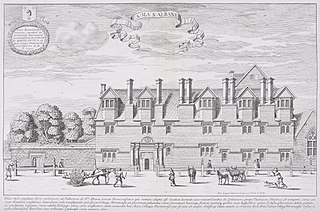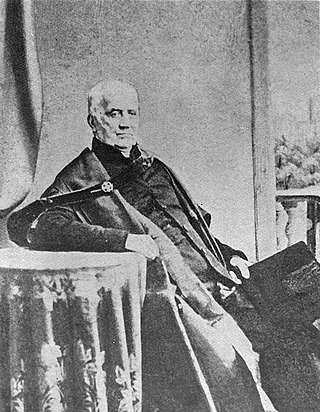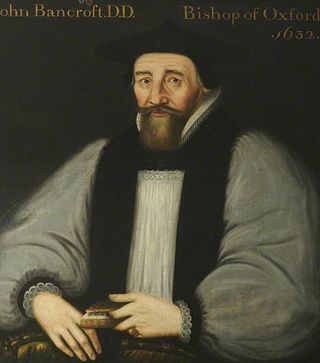Related Research Articles

St Alban Hall, sometimes known as St Alban's Hall or Stubbins, was one of the medieval halls of the University of Oxford, and one of the longest-surviving. It was established in the 13th century, acquired by neighbouring Merton College in the 16th century but operated separately until the institutions merged in the late 19th century. The site in Merton Street, Oxford, is now occupied by Merton's Edwardian St Alban's Quad.

Charles Thorp, was an English churchman, rector of the parish of Ryton and, later, Archdeacon of Durham and the first warden of the University of Durham.
Nicholas Metcalfe was an English churchman and college head.
John Browne (1687–1764) was an Oxford academic and administrator. He was Fellow and Master of University College, Oxford, and also served as vice-chancellor of Oxford University.

John Bancroft was an English clergyman and academic, who served as Bishop of Oxford and Master of University College, Oxford.
James Dugdale was an Oxford academic and administrator. He was Fellow and Master of University College, Oxford.
Cuppers are intercollegiate sporting competitions at the Universities of Oxford and Cambridge. The term comes from the word "cup" and is an example of the Oxford "-er". Each sport holds only one Cuppers competition each year, which is open to all colleges. Most Cuppers competitions use the single elimination system. The main exception is that rowing is organised into The Bumps as opposed to a Cuppers-style tournament.

Robert Shorton was an English churchman and academic, first Master of St John's College, Cambridge and Archdeacon of Bath.
Roger Leyburn was an English churchman and academic, Master of Pembroke Hall, Cambridge, archdeacon of Durham and bishop of Carlisle.
John Anthony Morrison was the Archdeacon of Oxford from 1998 until 2005.
Richard West (1670?–1716) was an English churchman and academic, and was archdeacon of Berkshire from 1710.
Adam Squire or Squier was an English churchman and academic, Master of Balliol College, Oxford, from 1571 to 1580, and Archdeacon of Middlesex from 1577.

The Venerable Edward Davenant or D’Avenant, DD (1596–1679) was an English churchman and academic, Archdeacon of Berkshire from 1631 to 1634, known also as a mathematician.
Benjamin Frederick Smith was the Archdeacon of Maidstone from 1887 until 1900.
Thomas Frederick Buckton was an Anglican Archdeacon in the Mediterranean from 1922 until his death.
John Sleech (1711–1788) was the Archdeacon of Cornwall from 1741 to 1788.
John Eeles (1658–1722) was an Anglican priest in Ireland in the late 17th and early 18th centuries.
Thomas Singleton was an English clergyman and academic.
John Thayne or Thane was an English churchman, Archdeacon of Chester in 1707.
Stephen Cheston was an English lawyer and priest. He was appointed Archdeacon of Winchester under Mary I of England, and retained the position for the rest of his life, despite an attempt to remove him by legal means under Elizabeth I.
References
- ↑ Carr, William, University College , Routledge, 1998. ISBN 978-0-415-18632-2. Chapter V, The Sixteenth Century (pages 74–94).
- ↑ Darwall-Smith, Robin, A History of University College, Oxford. Oxford University Press, 2008. ISBN 978-0-19-928429-0. Pages 99–100.
- ↑ Alumni Oxonienses 1500-1714, Covert-Cutts
- ↑ "Crayford, John (CRFT511J)". A Cambridge Alumni Database. University of Cambridge.
- ↑ British History – Archdeacons of Berkshire